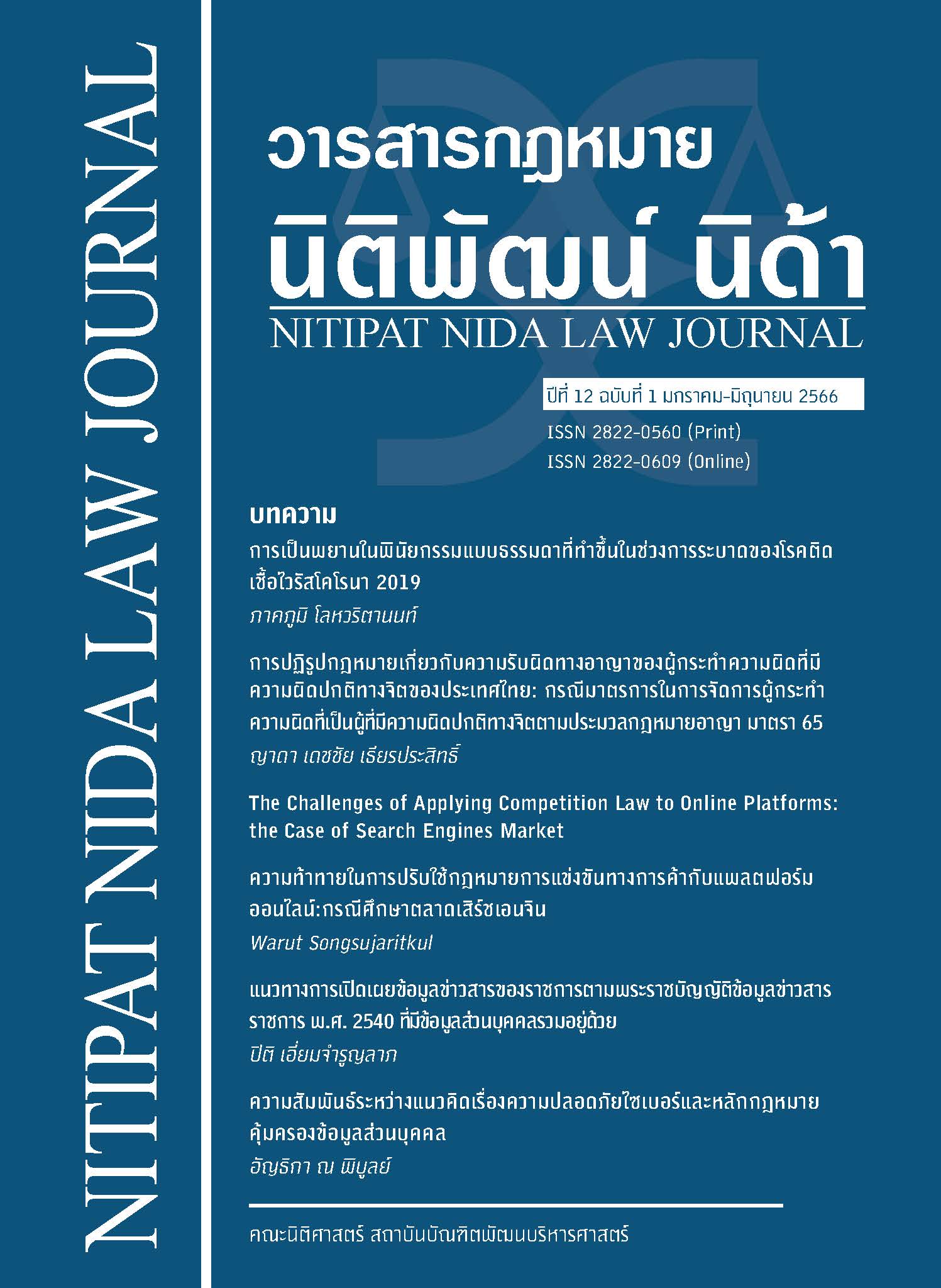Witnessing an Ordinary Will made during the COVID-19 Pandemic
Keywords:
Ordinary Will, Witnessing a Will, Remote Witnessing, COVID-19Abstract
To make a will in Thailand, a testator is free to choose the forms of will he wishes to do. One of the most popular forms of will chosen by the testator is an ordinary will. However, the critical problem that arises if the testator decides to make an ordinary will during the COVID-19 pandemic, is that it must be signed by the testator in the presence of at least two witnesses, and the witnesses are required to sign their names certifying the testator’s signature. Thus, gathering the testator and witnesses in the same place poses a risk of contracting COVID-19. Therefore, the governments of various jurisdictions then decided to resolve this issue by allowing the adoption of remote witnessing to be applied to the wills made during COVID-19. This article focuses on the legal issues that may arise if remote witnessing measures, such as witnessing via video conference, are adopted instead of requiring witnesses to be physically present when witnessing the will. It will explore the examples of foreign law regarding remote witnessing in an ordinary will made during COVID-19. Lessons learned from them can be used to analyze and suggest a possible way to amend the Thai laws related to ordinary will witnessing will cope with the COVID-19 outbreak.
References
จิ๊ด เศรษฐบุตร, หลักกฎหมายแพ่งลักษณะนิติกรรมและสัญญา (พิมพ์ครั้งที่ 5 แก้ไขเพิ่มเติม, โครงการตำราและเอกสารประกอบการสอนคณะนิติศาสตร์ มหาวิทยาลัยธรรมศาสตร์ 2552).
ศนันท์กรณ์ โสตถิพันธุ์, คำอธิบายนิติกรรม สัญญา (พิมพ์ครั้งที่ 16 แก้ไขเพิ่มเติม, สำนักพิมพ์วิญญูชน 2554).
ศักดิ์ สนองชาติ, คำอธิบายประมวลกฎหมายแพ่งและพาณิชย์ ว่าด้วยนิติกรรมและสัญญา (พิมพ์ครั้งที่ 10 แก้ไขเพิ่มเติม, สำนักพิมพ์นิติบรรณการ 2551).
บวรศักดิ์ อุวรรณโณ, คำอธิบายกฎหมายแพ่งและพาณิชย์ว่าด้วยมรดก (พิมพ์ครั้งที่ 2 แก้ไขเพิ่มเติม, สำนักพิมพ์นิติธรรม 2548).
พินัย ณ นคร, กฎหมายเกี่ยวกับธุรกรรมทางอิเล็กทรอนิกส์ในยุคดิจิทัล (สำนักพิมพ์วิญญูชน 2561).
พินัย ณ นคร, กฎหมายลักษณะมรดก (พิมพ์ครั้งที่ 4 แก้ไขเพิ่มเติม, สำนักพิมพ์วิญญูชน 2558).
ไพโรจน์ กัมพูสิริ, หลักกฎหมายมรดก (พิมพ์ครั้งที่ 7 แก้ไขเพิ่มเติม, โครงการตำราและเอกสารประกอบการสอน คณะนิติศาสตร์ มหาวิทยาลัย ธรรมศาสตร์ 2563).
สมยศ เชื้อไทย, คำอธิบายวิชากฎหมายแพ่ง : หลักทั่วไป (พิมพ์ครั้งที่ 23, สำนักพิมพ์วิญญูชน 2560)
สอาด นาวีเจริญ, คำบรรยายประมวลกฎหมายแพ่งและพาณิชย์ บรรพ 6 ว่าด้วยมรดก (สำนักพิมพ์นิติบรรณการ 2517).
สำนักงานพัฒนาธุรกรรมทางอิเล็กทรอนิกส์, สัญญาต้องเป็นสัญญา (2557).
Brian Sloan, ‘Witnessing Law Reform in the Coronavirus Era’ (Law Faculty Blogs University of oxford,2020)<https://www.law.ox.ac.uk/research-and-subject-groups/property-law/blog/2020/08/witnessing-law-reform-coronavirus-era > accessed 5 August 2022Herbert L. Packer, The limits of criminal sanction (Stanford University Press, 1968).
Bridget J Crawford, Kelly PurserandTina Cockburn , ‘Wills Formalities Beyond COVID-19: An Australian-United States Perspective’ (2020) 5 UNSW Law Journal Forum 1.
Catherine Rendell, Law of Succession (Macmillan Press Ltd 1997).
Irwin Mitchell, ‘Witnessing A Will’ (2022) (irwinmitchell) <https://www.irwinmitchell.com/personal/wills-trusts-estates/wills/guide/witnessing-a-will> accessed 8 August 2022.
Jan Biemans, ‘Will Requirements for Last Wills Remain as They Are? : The ‘Physical Presence Requirement’ of Witnesses and Notaries in the Light of the COVID-19 Interim Measures and the EU Freedom of (Notarial) Services’ (2021) 3 Utrecht Law Review 51.
Kansas Executive Order No.20-20 (Apr.9, 2020), no.2.
Kimberley Martin, ‘Technology and wills – the dawn of a new era (COVID-19 special edition)’ (STEP, 2020).
Mariusz Załucki, ‘Preparation of Wills in Times of COVID-19 Pandemic – Selected observations’ (2020) 2 Journal of Modern Science.
Mariusz Załucki, Wills Formalities versus Testator’s Intention: Functional model of effective testation for informal wills (Nomos Verlagsgesellschaft mbH & Co. KG 2021).
Ontario Regulation 129/20 (Order under subsection 7.0.2 (4) of the Act – Signatures in wills and powers of attorney), Schedule 1, no.1.
Roger Kerriedge, The Law of Succession (10th edn, Sweet & Maxwell 1996).
Tedros Adhanom Ghebreyesus, ‘WHO Director-General's opening remarks at the Mission briefing on COVID-19 - 11 March 2020’ (2020) <https://www.who.int/director-general/speeches/detail/who-director-general-s-opening-remarks-at-the-media-briefing-on-covid-19---11-march-2020> accessed 5 August 2022.
UK Government, ‘Guidance on making wills using video-conferencing’ (Gov.UK, 2020) <https://www.gov.uk/guidance/guidance-on-making-wills-using-video-conferencing> accessed 15 August 2022.
UK Law Commission, Making a will- Consulting paper 231 (2017).
Downloads
Published
How to Cite
Issue
Section
License
Copyright (c) 2023 Nitipat NIDA Law Journal

This work is licensed under a Creative Commons Attribution-NonCommercial-NoDerivatives 4.0 International License.



